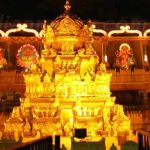Magha maasam is the 11th month of Hindu lunar calendar. Makha nakshtram (star) falls on the pournami day of this month. “Magham” is a Sanskrit word Ma+Agham. “Ma” means not present and “Agham” means sin, evil, suffering, grief and Magha maasam is the month which is highly meritorious, auspicious and free from any sin or suffering. Lord Maha Vishnu in the name of Maadhava is the presiding deity who governs Magha Maasam and to be worshiped.
This month is considered auspicious to perform all the major occasions like marriage, upanayanam (thread ceremony), house warming etc. One year on the earth is considered as one day in the higher abode and this month starts the dawn of the day to the Gods. Deepa daanam (lighting a lamp) is auspicious in Karthika maasam and magha snanam (holy dips in holy rivers) is the major ritual of magha maasam.
The month in which Moon will be at or nearer to the constellation of Maghah nakshathra on the full moon day that month is reckoned as Maagha maasam. In lunar calendars, Maagh may begin on either the new moon or the full moon around the same time of year, and is usually the eleventh month of the year. Its is named because in this month, The full moon is usually found nearby or within the star cluster called “Magha”. In solar calendars, Maagh begins with the Sun’s entry into Capricorn, and is usually the tenth month of the year.
It is believed that the Hindu Goddess of wisdom and learning – Goddess Saraswati, the Sun God or Surya Bhagawan and Lord Shiva in the lingam form were born in this month. On the fifth day in the brighter half of the moon, Basant Panchami or Saraswati Pooja is celebrated across the country. Hence the month is particularly dedicated to Lord Surya and people worship Sun god on the four Sundays of Maagha maasam. Reciting Aditya Hrudyam on the four Sundays of the month would be very effective.
Maagha maasam in India marks the beginning of the most awaited spring season and the end of the dry winter season. As the nature starts blooming once again with the growth of fresh new leaves and flowers all around, this is the most favorite season of the people.

Significance of Magha snanam
While Kartheeka masam is given lot of significance for lighting of lamps, Maagha masam is given special significance for taking bath that is known as Maagha Snanam. It generally starts from Pushya sukla Pournami and ends with Magha sukla Pournami or it can also be from Makara Sankramana to Kumbha Sankramana as per Solar/Luni-Solar calendar. For followers of lunar calendar it starts from Pushya Bahula Amaavaasya and ends with Maagha Bahula Amaavaasya. During this period it is prescribed to take bath early in the morning before Sunrise preferably during Arunodaya kala. This sacred bath is preferred to be taken in any river, lake or theertha or at least at home. Apart from the daily routine (Nithya Karma) special arghya is to be given to Lord Madhava and Sun God after Maagha Snanam.
Advantages of Magha Snana
- Taking a bath (Snaana) which is always refreshing not only cleanses our external body, but also has significance from religious and spiritual point of view in the daily routine (nithya karma) of an individual.
- In Hindu philosophy daily routine (nithya karma) generally begins with a bath before worshiping God, a discipline that has been inculcated with a sense of cleanliness in our actions.
- If it is during an auspicious period like Maagha maasa its spiritual merits are in multiple.
- It is said that Maagha Snana can purify a person even from ghastly and dreadful sins committed.
- Taking bath early in the morning during Maagha maasa is highly sacred, spiritual and meritorious.
- Sacred texts like Vayu Purana, Brahmaanda Purana have made reference to the merits and significance of Maagha Snaana.
- According to Dharma Saastras, merits of Maagha Snaana increases depending on the place (location) where the bath is taken as given below….
- With hot water at home–Merits equivalent to Six years of such Snana;
- From the waters of a well –12 years of such Snana phala;
- In a lake –24 years of such Snana phala;
- In any river – 96 years of such Snana phala;
- In any sacred river – 9600 years of such Snana phala;
- At the confluence of sacred rivers–38400 years of such Snana phala; (four times of the above)
- In Ganga (Ganges) River–Merits equivalent to 38400000 years of such Snana phala; (1000 times of the above)
- At Triveni Sangam (Prayaga) – 100 times of Ganga Snana phala;
- Maagha Snana in sea (Samudra) is considered more meritorious than all the above.
- Wherever may be the place of bath; one should always remember to recollect (recite) Prayaaga and also pray Maasa Niyamaka Maadhava (Lord Vishnu) silently.
- Those who cannot take bath as said above for the entire month should at least take it for the last three days which is known as Anthya Pushkarini.
- Maagha Snanam is prescribed for all ages of men and women.
- Lord Vishnu in the name Maadhava is the presiding deity (Masa Niyamaka) who governs Maagha Masam and to be worshiped.
- We find a reference to the words Madhava in sloka # 8, 18 and 78 of Sri Vishnu Sahasra Nama Stothram. Madhava means one who is the consort of Goddess Lakshmi Devi, one who is the bestower and Lord of superior knowledge.

How to do Magha Snanam
Go to river early in the morning before sunrise(The stars should be visible) , Do sankalpa and Take a holy dip in the water and do arghya
Sankalpa:
Maagha snaanam karishyaami makarasthe divaakare|
Aasamaapthi mahaadeva nirvignam kuru maadhava||
Arghya Mantra
Nama: kamalanaabhaaya namaste jalashaayine |
Namastestu hrushikesha gruhaanaargyam namostute ||(Arghya to Sri Hari)
Savitre prasavitre cha parandhaama jale mama |
Tvattejasaa paribhrashtam paapam yaatu sahasradhaa ||(Arghya to sun/surya)
Charities to be given in Magha masam
- Veni Daana at Prayaaga,
- Thila-Paathra Daana,
- Salagrama Daana,
- Anna Daana ,
- Gold or gold items,
- Hiranya danaa,
- Thila Daana,
- Kooshmaanda Daana
- Apart from the above Thila homa and Thila bhakshana are also prescribed during Maagha maasam.
The last three days of maagha maasa are called antya puShkarini. If taking a ceremonial bath on all days during maagha maasa is not possible, people should make an effort to at least do so during these three days.
Must read Divine Mysteries : Amazing Mysteries of Puri Jagannath Temple
Must Read Swami Ramdev Makes a Bold Commitment









